Cross-Border Trade in North America: Uncertain Times, Tried-and-True Solutions
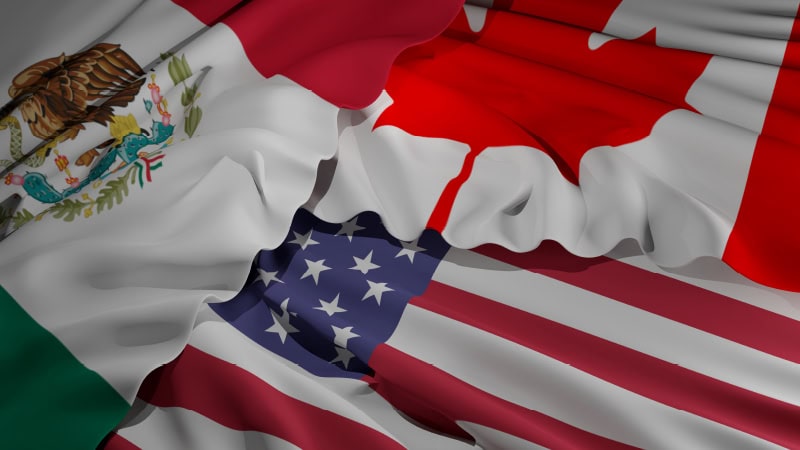
Logistics providers can offer deep understanding of customs and regulations, as well as technology and capacity that can streamline operations and move shippers’ goods safely and efficiently—no matter the geopolitical environment.
For decades, Canada, Mexico, and the United States have been tightly tied to each other. Partly an accident of geography, it’s also a result of cross-border commerce, many shared values, and with Canada, a shared language. In 2024, U.S. goods traded with Canada totaled about $762 billion, and with Mexico, about $840 billion, the U.S. Census reports.
While the current geopolitical environment is in flux, businesses throughout these countries are carrying on. And logistics providers are working diligently to ensure they can help supply chain organizations continue operating across borders in a timely and effective manner.
Many supply chains are interconnected among all three countries, and that’s wonderful, says David Cox, chief executive officer with Polaris Transportation Group. Especially after the pandemic, many businesses made capital investments based on the rules of engagement outlined in the United States-Mexico-Canada Agreement (USMCA). The agreement’s provisions helped to shorten lead times and inject agility into companies’ supply chains.
“There’s churn in the water right now just because we don’t know what the new rules of engagement are. Yet the three countries are entangled, in a good way,” Cox says. Together, the countries are home to a well-educated, competitively priced workforce, a massive market, and the infrastructure needed to make goods at a relatively low cost, he says.
Companies that shift from offshore production, sometimes thousands of miles from a company’s market, and instead manufacture in an adjoining country, often can use ground transportation for assembly and distribution, says Brad Colvin, director of business development and logistics with Tri-National, Inc. They benefit from reduced transit times and the potential for greater flexibility in production.
Nearshoring can also eliminate the risks of lengthy port delays, container ship logjams, and lost cargo due to geopolitical turmoil. “Nearshoring is not as logistically challenging as offshore manufacturing, as everything is thousands of miles closer to where the end product is produced,” Colvin says.
Established Operations Enjoy an Edge
For example, Mexico produces around 180,000 tractors each year, with about 90% heading to the United States and Canada, says Diego Anchustegui, chief marketing officer with EASO, which is now partnered with Hub Group through a joint venture. “The factories are already set up in Mexico. The production operations and supply chains took a lot of years to build.”
Replicating them elsewhere within even a 10- or 20-year time frame would be difficult. This provides an edge to companies that have already established operations in Mexico for the North American market.
Mexico’s shared border with the United States offers businesses targeting a North American consumer base the opportunity for greater supply chain efficiency and control, when compared to overseas options, says Alex Garza, vice president of Mexico Cross-Border Services at Landstar.
“Companies that move operations from other parts of the world to North America can often lower transportation costs and shorten lead times, while gaining the flexibility to pivot quickly if market conditions change,” he adds.
It’s difficult to know how the tariffs proposed by the U.S. Administration will play out. They may cut the range of goods that move across borders, particularly for products that are “on the margin,” says Jason Miller, interim chair of the Department of Supply Chain Management at Michigan State University. These are products that, absent a tariff, earn enough profit that it makes sense to trade them across borders. “Slap a 25% tariff on them, and it no longer makes sense to bring them in,” he says.
Overcoming Complexities and Challenges
To benefit from cross-border operations, most companies need to tackle several challenges. These include complex customs regulations and fragmented service providers, says Jose Minarro, director of cross-border operations with Sunset Transportation. “For U.S. shippers, understanding the nuances of cross-border logistics, including cultural, operational, and regulatory differences, is vital for success,” he adds.
The continuously evolving regulatory landscape of cross-border transportation also creates complexity. “Knowing how to navigate customs requirements and transportation laws across multiple countries is crucial,” Garza says.
Another challenge can arise when companies move production to North America to avoid the tariffs levied on goods coming from China, yet still need to source the raw materials from China, says Ken Cochran, managing director in the consumer and retail group of Alvarez & Marsal, a global professional services firm.
Because these materials still travel from other parts of the world, some benefits of nearshoring are minimized. In addition, the capability to create some raw materials is not yet present in the Americas to the extent needed to shift manufacturing operations from other regions of the world, he says.
One step to addressing these challenges is understanding the entire network of raw materials within a company’s supply chain, Cochran says. Companies also need to consider how their supply chain might impact both costs and sales.
For example, if the cost of labor to produce T-shirts in Mexico is four times the rate in China, it might seem obvious that China is the logical option. Yet for items that are popular sellers, the difference in lead times between the two countries might prove critical.
Working with reliable logistics partners that have expertise in customs clearance, warehousing, and cross-border freight can also help companies manage these challenges, Minarro says. Advanced AI-driven platforms that can provide data-driven solutions to streamline operations and increase efficiency also help.
A quality transportation provider will not only supply freight solutions, but also can assist shippers in navigating the regulatory environment.
“Companies should look for cross-border logistics providers that are CTPAT certified and have long-standing track records of successful cross-border shipments,” Garza says. Providers should also have effective capacity management processes in place, such as dedicated Mexico trailing equipment to help maintain sufficient resources amidst higher northbound demand, he adds.
The logistics providers highlighted here can help companies address the challenges and achieve the benefits of cross-border operations.
Driving Performance Through Exceptional Service and Solutions
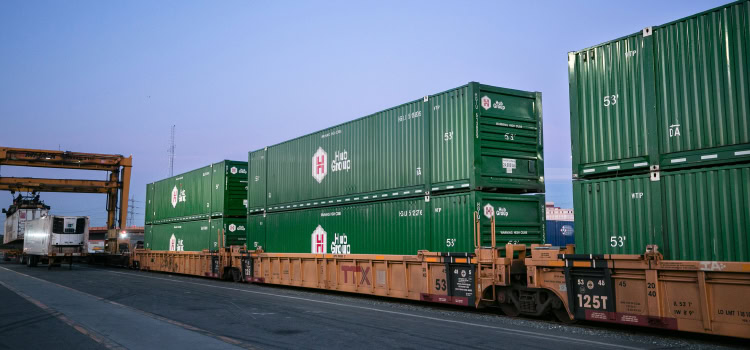
Hub Group expanded its intermodal and cross-border service offerings in Mexico through its joint venture with EASO, a trucking logistics provider and Mexico’s largest intermodal carrier.
Hub Group, a comprehensive supply chain solutions provider, expanded its intermodal and cross-border service offerings in Mexico through its joint venture with EASO, a trucking logistics provider and the largest intermodal carrier in Mexico.
A family-led company, EASO boasts a 50-year track record working with the Mexican market and has the same cultural alignment of service, integrity, and innovation as Hub Group.
Combining Hub Group’s robust capabilities with EASO’s extensive network and expertise in Mexico enhances end-to-end solutions and adds significant scale for all customers. “With this joint venture, Hub Group becomes the only U.S. intermodal carrier to actually have boots on the ground and terminals in Mexico,” says Anchustegui. “We can reach almost any part of Mexico, any part of the United States, and much of Canada.”
Together, the companies add even more value to clients, says Chris Hoffmeister, chief commercial officer with Hub Group.
“We help clients save money and access more effective transportation options because we have market and cross-border expertise, a low cost structure focused on service and security, along with capacity, drivers, and equipment across all regions in Mexico and the United States. As a result, we are a complete supply chain solutions company that can move freight in any segment, including from a foreign factory to a distribution center, and then to a store or even someone’s house for install,” he adds.
Hub Group is certified through the Customs Trade Partnership Against Terrorism (CTPAT). The company also works closely with authorities to reduce the risk of cargo theft, Anchustegui says. Security incidents on intermodal cargo run as low as 0.05% in some corridors, making it one of the safest ways of transporting goods in Mexico, he adds.
Offering Unique Solutions
Hub Group offers a range of unique and innovative solutions, Hoffmeister says. For example, through its heavyweight program, Hub Group complies with relevant regulations while moving overweight goods more efficiently and cost-effectively between Mexico and the United States.
Hub Group also offers approximately 10 million square feet of warehousing space in the United States, as well as strong capabilities in truckload, less-than-truckload, managed transportation, final mile, consolidation, and fulfillment.
Hub Group provides technology that offers shippers end-to-end visibility as their cargo moves to its destination, including the industry’s first GPS-enabled container fleet.
Hub Group’s extensive network of IoT devices and connections provide clients with unrivaled visibility to their supply chains. Automated monitoring and in-field technology, including door sensors to track any unauthorized access, further safeguard clients’ data and products. This is available on both Hub Group and EASO equipment, further protecting shippers’ freight.
The company’s online freight management platform, Hub Connect, leverages artificial intelligence and machine learning, providing clients with 24/7 access to their networks, as well as the location of in-transit shipments. Among other capabilities, it provides a visual breakdown of shipment volume, mode, spend, and other data, so shippers can easily monitor them.
Due to its thoroughly documented processes and scalable systems, Hub Group is able to support both small and large shippers, Hoffmeister says. Its employees focus on specific verticals, developing expertise in the requirements, regulations, and trends impacting each.
By helping one client adjust its transportation modes and shipping processes when moving goods from Mexico to the United States, EASO helped it slash its transportation spending by about $8 million, Anchustegui says.
“Nobody else has an intermodal infrastructure like us in Mexico,” he says. “And now combined with Hub Group, we offer a robust cross-border end-to-end solution, tailored to solve our clients’ challenges, no matter what part of the country they need to reach.”
Designed to Respond, Built to Deliver
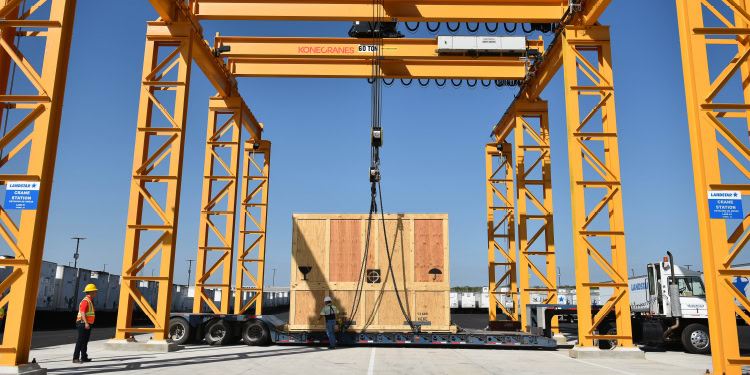
Landstar’s U.S./Mexico Logistics Service Center, in Laredo, Texas, features the region’s only 120-ton standalone bridge crane, which streamlines the transloading process.
For more than 25 years, Landstar has provided comprehensive, end-to-end cross-border solutions at all major gateways between the United States and Mexico.
“Our network extends across North America and includes more than 78,000 carriers, 270 interchange agreements, and 1,000 independent agents,” says Garza, the vice president of Mexico Cross-Border Services. Landstar’s scalable cross-border solutions include truckload, transloading, through-service, and customs brokerage. “Landstar has built a reputation as one of the safest, most secure, and reliable transportation providers in the industry,” Garza adds.
As a CTPAT-certified company, Landstar is dedicated to upholding high security and compliance standards. Independent Landstar freight agents work directly with customers to create logistics solutions tailored to their specific supply chain and transportation needs.
Increasing Efficiencies
Landstar’s U.S./Mexico Logistics Service Center, based in Laredo, Texas, is home to the region’s only 120-ton standalone bridge crane, which was specifically designed to handle oversized and heavy freight. This streamlines the transloading process while minimizing the risk of damage during handling, even with complex shipments.
What’s more, it’s operated at a Landstar-owned facility, which supports increased efficiency. While they’re in transit, drivers can coordinate to have the crane prepared for oversized loads, cutting overall transload time and helping to avoid delays that are more likely when relying on third-party cranes.
Clients from a range of industries, including modular construction, marine, and heavy equipment choose Landstar for its distinguished reputation, quality service, and specialized solutions for heavy haul freight at the border.
Landstar worked with one customer to streamline its import processes through Laredo, and cut warehousing and distribution expenses. Prior to partnering with Landstar, the company had been importing its products into the United States from Mexico and storing them in a warehouse, where they were distributed to the end user.
The company was dealing with numerous parties, including carriers and customs brokers in both Mexico and the United States, as well as the distribution warehouse in Laredo. As a result, they were struggling to meet delivery commitments to their U.S. customers, Garza says.
Landstar offered a one-stop solution for U.S. and Mexico transportation, eliminating the need for a third-party distribution center in Laredo. Instead, Landstar was able to transload the shipments once they crossed the border and coordinate final delivery to the company’s customers through a BCO (Landstar’s term for independent owner-operators leased to Landstar).
Now, the cargo often ships from Laredo the same day it arrives from Mexico.
As a result, the customer saved on warehousing and eliminated the risk of product damages occurring due to storage in a heavily trafficked warehouse, Garza says. The solution also cut transit times while improving customer satisfaction.
Building on Safety as a Foundation
In addition to improving its customers’ operations, Landstar prioritizes safety as the foundation for the high-quality service it is known for. This is supported through network-wide initiatives including strict owner-operator qualification requirements, partnering with customers through the Mutual Understanding of Safety Together (M.U.S.T.) program, and monthly Safety Thursday calls.
The company also has several safety efforts in place for its cross-border services. As a CTPAT-certified provider, Landstar has an established partnership with U.S. Customs and Border Protection and is committed to operating in compliance with the agency’s security requirements.
In addition, tracking technology provides visibility into the location of customers’ shipments as they travel in the United States and Mexico, adding an extra layer of security and peace of mind.
Landstar’s unique business model combines the expertise and personalized service of local independent agents, with the capacity and resources of a vast North American network, Garza says.
“We have the specialized knowledge, capacity, and equipment necessary to meet any requirement,” he adds.
A Singular Focus on Cross-Border
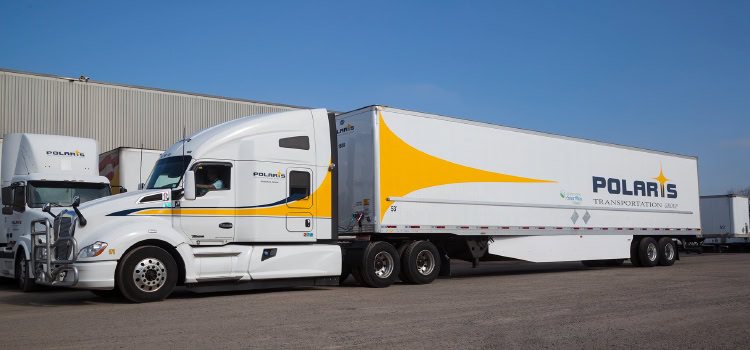
Polaris Transportation Group specializes in cross-border LTL shipments, offering daily departures between Canada and the United States.
Polaris Transportation Group, an award-winning carrier, is one of Canada’s largest privately held asset-based carriers. Its niche is cross-border, less-than-truckload (LTL) shipments, with daily departures between Canada and the United States.
“We compete against a lot of carriers out there, and some offer cross-border Canadian services as another tool in the toolbox,” CEO Cox says. “This is my toolbox.”
Since 1994, Polaris has been the choice for Fortune 500 companies, logistics providers, global freight forwarders, and small and large businesses looking for expert cross-border services and expertise.
In addition to the experience it has gained handling cross-border shipments and complying with regulations, Polaris offers industry-leading technology and is committed to environmental sustainability, community engagement, and continual growth.
Polaris Transportation Group comprises four operating divisions. NorthStar Digital Solutions is Polaris’ in-house digital factor. “We’ve invested heavily in people and technology to digitize, to scale the business, and to be competitive,” Cox says.
Polaris Transport Carriers offers LTL services, while Polaris Global Logistics, a third-party logistics provider, handles just about any freight that isn’t LTL.
As its name suggests, Polaris Commercial Warehousing provides Canadian distribution for warehousing and fulfillment clients. Some U.S. clients prefer not to invest in their own physical facilities in Canada. Polaris can transport their cargo, hold it at its warehousing fulfillment facility, and then distribute the products across Canada. Demand for this service has ramped up since the pandemic, Cox notes.
For example, Polaris worked with a manufacturer of high-end home appliances that’s based in the U.S. Midwest. They had been using another logistics provider to serve their Canadian clients, but experienced challenges with product damage.
For more than two years, Polaris has been transporting the company’s products into its warehousing distribution facility and then across Canada. They arrive at their destinations free from damages and exceptions.
“The company doesn’t want a bricks-and-mortar facility in Canada, but their customers are paying a lot of money for the products. The delivery process needs to be as seamless as if the company was right next door to each customer,” Cox says. Polaris can deliver that quality experience.
Sustainability Initiatives Gain Momentum
Cox and his team are currently working to expand Polaris’ direct carrier service from northeastern United States into Quebec. This will cut the distance some shipments travel, saving customers time and money. And because these shipments will travel fewer miles, it’s also a more sustainable option.
Over the past year and a half, Polaris has focused heavily on sustainability. “I knew nothing about sustainability, but I am smart enough to know when I don’t know anything,” Cox says.
So, he read extensively and connected with several Canadian universities.
Then, Polaris identified its sustainability baseline, or the steps it already had been taking to move to more sustainable operations. “I was pleasantly surprised,” Cox says, noting that Polaris had been doing more than he’d assumed.
Even so, Polaris has partnered with Green Economy Canada and several other organizations to establish the Polaris Sustainability Action Plan and work toward more rigorous targets. “I believe you can take care of the triple bottom line: people, planet, profit,” he says. “You can do good and do well at the same time.”
Family Roots, Global Reach, and Quality Customer Service
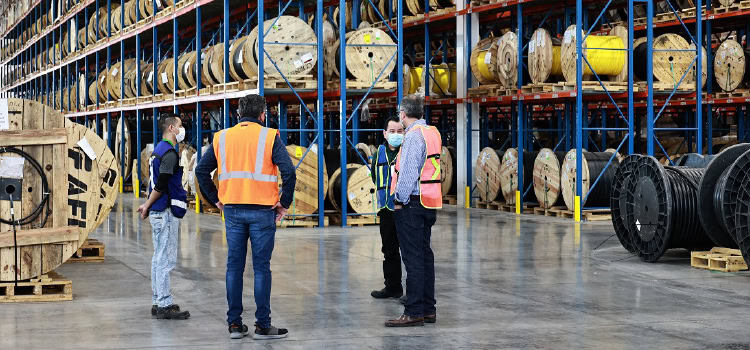
Providing cross-border logistics and warehouse solutions, Sunset Transportation recently opened facilities in Laredo, Texas, and Queretaro, Mexico.
“By listening closely to our customers and the market, we deliver efficient, tailored strategies that drive success,” says Minarro, cross-border operations director, Sunset Transportation.
Sunset excels in cross-border and nearshoring logistics and can simplify cross-border logistics between the United States and Mexico by navigating complexities like currency, transportation processes, and border requirements, Minarro says. The company’s seamlessly integrated transportation management system ensures efficient operations on both sides of the border, providing customers with end-to-end visibility to mitigate freight risks.
“Even as the growth in ecommerce adds challenges to logistics, Sunset leverages technology and proven processes to manage complexities like last-mile delivery, offering real-time shipment tracking and reliable solutions to ensure on-time deliveries,” he adds.
Sunset leverages both AI and industry expertise to streamline supply chains and maximize efficiency and cost savings, Minarro says. Sunset can connect shippers with customized freight and warehousing solutions. As a multi-faceted transportation provider, Sunset offers drayage carrier solutions, along with comprehensive customs, warehousing, and freight brokerage services in both the United States and Mexico.
While its technology is state-of-the-art, Sunset continues to operate with five core values: flexibility, loyalty, responsiveness, accountability, and relationships. These values guide actions and support the company’s mission of customizing and executing transportation solutions to help customers continuously improve their supply chains.
The company’s legacy dates to 1861, with the launch of Williams Paper Company. In 1989, Jim Williams, the founder’s grandson, ventured into transportation, launching Sunset Transportation from his home.
Since then, Sunset has grown rapidly. In 2012, it developed the predecessor to its LOGIK technology, which provides order visibility, in-transit tracking, and shipping performance metrics, among other features. Also in 2012, Sunset first appeared on Inc. magazine’s list of the 5,000 fastest growing companies.
In 2018, Snowland Freight Services joined Sunset Transportation. In 2019, Sunset opened a branch office in Laredo, Texas, providing full cross-border logistics and warehouse solutions. By 2021, Sunset had opened a third cross-border office in Queretaro, Mexico.
Providing End-To-End Supply Chain Solutions
In 2022, Sunset joined Armada Supply Chain Solutions. The acquisition allows both companies to provide a range of data-driven, end-to-end supply chain solutions. Today, Armada Sunset Holdings encompasses three operating companies: Armada, Sunset Transportation, and ATEC Systems. Together, the companies specialize in full-service solutions, including multimodal domestic and international freight brokerage, full integration technology capabilities, supply chain engineering, warehousing, and freight payment.
Two years later, in 2024, Inbound Logistics recognized Sunset as a G75 Green Supply Chain partner for its commitment to supply chain sustainability through eco-friendly initiatives and best practices that enhance a more sustainable global supply chain.
Sunset Transportation recently worked with a mid-sized automotive parts manufacturer that was looking to expand its operations into Mexico. By analyzing the company’s freight needs and leveraging Sunset’s connections with local warehousing and customs partners, Sunset helped the manufacturer reduce transit times by 20% and costs by 15%. This allowed the company to meet growing demand while maintaining its competitive edge.
As manufacturers in Mexico convert their facilities for production, Sunset is able to offer its warehouses in Laredo for efficient distribution, Minarro says.
While it’s hard to say how potential tariffs and the current political climate may impact different companies, many of Sunset’s customers are focused on growth and expansion, whether by entering new markets or boosting capacity, he says. Sunset stands ready to help them achieve their goals.
Leading the Way
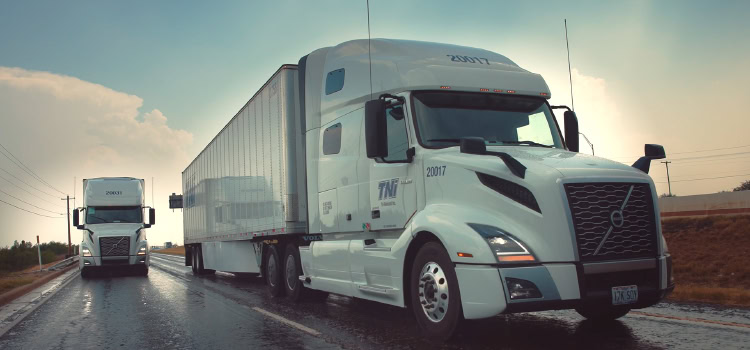
TNi, a leading North American cross-border freight specialist, offers door-to-door delivery services extending from Mexico to Detroit, Michigan, and into Ontario, Canada.
Tri-National, Inc. (TNi), a premier USMCA transportation and logistics provider, offers door-to-door delivery services extending from Mexico to Detroit, Michigan, and into Ontario, Canada, says Colvin, director of business development and logistics. TNi also offers “milk-run capabilities” that cover about 400 miles of the border between Texas and Mexico.
As a North American cross-border and nearshoring freight specialist, TNi offers an asset fleet as well as industry expertise gained from more than 30 years in the business. TNi’s primary strength is seamless cross-border transportation via service points in Mexico, through the Texas border, and across the U.S. Southeast and Midwest. TNi’s customer service team can provide bilingual support.
“We offer multiple Texas border crossing options, providing door-to-door service to and from Mexico without transloading,” Colvin says. This allows freight to remain on the same GPS-enabled trailer from origin to destination.
Because TNi is EDI-capable, shippers know where their products are at all times. TNi’s large Mexican carrier base partnership also helps to support its operations.
Cross-border shippers can turn to TNi for numerous services, including truckload shipping, warehousing, cross docking, transloading, transportation brokerage, and inventory management. TNi also provides short- and long-term storage solutions through its consolidation and warehousing facility in Laredo.
For import or export shipments, TNi has both the warehouse space and manpower needed for continuous cross dock and transload. Customers can access satellite tracking on all shipments.
TNi’s Laredo operation offers close access to both the World Trade International Bridge and the Laredo-Colombia Solidarity International Bridge. Warehousing and consolidation options are available at Tri-National’s Pharr/McAllen facility.
Streamlining Operations
“We work with companies of all sizes, from small businesses with only a handful of shipments per year, up to large, Fortune 500 corporations that ship thousands of loads annually,” Colvin says. TNi is able to handle the varying range of volume, and has the assets, expertise, and business infrastructure to accommodate the ebb and flow of production and shipping cycles.
Among the types of freight in which TNi specializes are transportation parts, electronics, retail, food and beverage, and various industrial components.
TNi is currently streamlining the transportation lane used by a large, multi-national manufacturing company that is working to accommodate a customer’s short lead times and rapid fluctuations in demand. “That translates to short lead times for us,” Colvin says.
Through meetings and continued open communication, Colvin and his team learned what the customer expected from TNi. This allowed TNi to work internally and propose a solution offering more consistent timing for pickups. Then, by leveraging its extensive network, TNi was able to identify the most effective ways to react to last-minute changes, while still ensuring on-time delivery for border clearance.
These changes will enable the company to ship across the border and meet the time frames required by its customer, while also reducing costs and improving shipment visibility, Colvin says.
To build on its current capabilities, TNi has been making significant investments in its infrastructure. In 2023, the company moved to a new and expanded corporate office. In 2024, it renovated its Texarkana area terminal.
“We are now located on 8 acres and working from a 13,000-square-foot combined office/shop facility in Hooks, Texas,” Colvin says.
The work isn’t done. By 2026, the current TNi terminal in San Antonio, Texas, will be replaced with a larger office and shop facility that spans 15,000 square feet, located on a 15-acre site.
“Tri-National operates 24/7/365,” Colvin says. TNi also is expanding its staff to ensure services remain interruption-free, he adds.
A New USMCA?
How likely is it that Canada, Mexico, and the United States will negotiate a new USMCA? The agreement went into effect in 2020 and is scheduled for review in 2026. Absent other action, it’s slated to expire in 2036.
Experts say the fate of the agreement is hard to discern. The fluctuations in the U.S.’s tariff strategy may prompt other countries to lose trust, Miller of Michigan State says.
Cox says he suspects negotiations will start earlier than the 2026 scheduled review. “I think in doing so, we can find some common ground so that North American free trade can continue to prosper and grow strong,” he adds.
